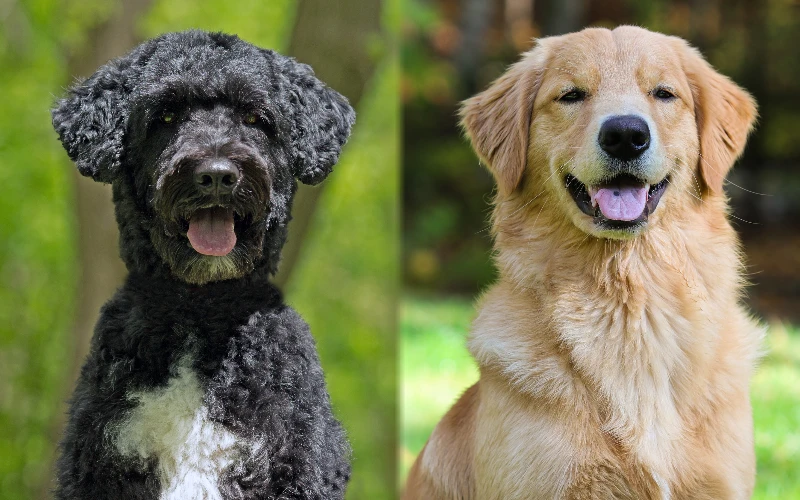Click Below to Skip Ahead
If you love Golden Retrievers and Portuguese Water Dogs (and why wouldn’t you?), imagine a mix of the two! This combination results in a medium-sized dog with teddy bear-like facial features, floppy ears, and much love to give.
The Golden Retriever Portuguese Water Dog combo is rare, though, so not much is known about this mix. In this post, we explore all the possibilities based on typical Golden Retriever and Portuguese Water Dog characteristics.
Breed Overview
Height:
17–24 inches
Weight:
35–75 pounds
Lifespan:
10–15 years
Colors:
Black, brown, white, dark golden, golden, light golden
Suitable for:
All kinds of loving families
Temperament:
Reliable, steady, friendly, affectionate, energetic, hardworking
Mixed breeds are a bit unpredictable when it comes to characteristics like size and coat colors, so you have to go by the parent breeds’ colors and sizes to get an idea of what your Golden Retriever Portuguese Water Dog mix will look like. Both breeds come in a variety of coat colors, and white markings may also be present, as this is possible in Portuguese Water Dogs. The coat type will likely be curly or wavy.
Golden Retriever Portuguese Water Dog Characteristics

Golden Retriever Portuguese Water Dog Puppies
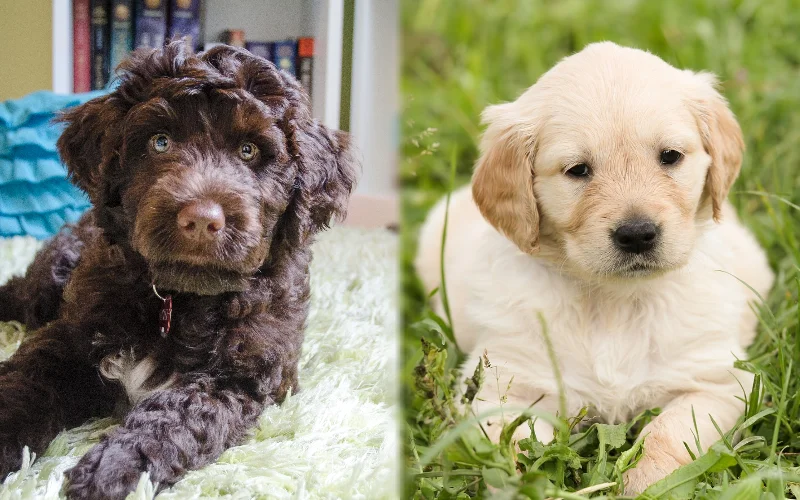
The Golden Retriever Portuguese Water Dog mix isn’t the most common, but if you buy one from a breeder, you’ll likely pay between $500 and $1,500, though maybe more, depending on the breeder. If you decide to contact a breeder for a Golden Retriever Portuguese Water Dog mix, do your research carefully to ensure that they have a good reputation and stringent welfare standards.
If you’re interested in Golden Retriever and/or Portuguese Water Dog mixes, you could always try shelters or rescue organizations. You might not find a Golden Retriever Portuguese Water Dog mix specifically, but you might just find a similar mix that melts your heart at first glance. Adoption is always well worth considering because it helps you skip expensive breeder fees and most importantly, gives you an opportunity to change a life for the better.
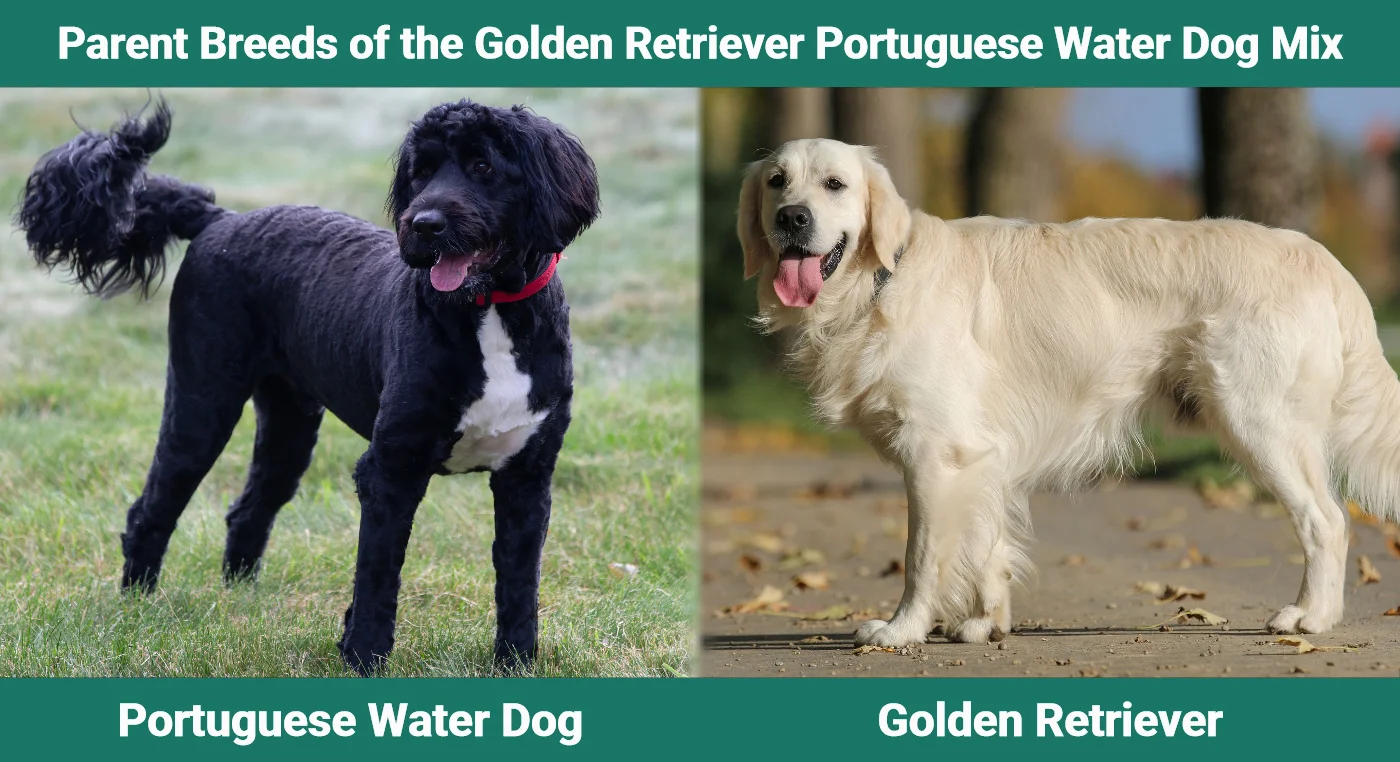
Temperament & Intelligence of the Golden Retriever Portuguese Water Dog Mix
Based on the common characteristics of the two parent breeds, the Golden Retriever Portuguese Water Dog mix is very likely to develop into a friendly, even-tempered, and devoted companion if adequately socialized.
Both parent breeds are highly intelligent dogs and need plenty of mental stimulation, so be ready to provide this in the form of toys, games, and little jobs like fetching things for you, tidying up toys, and seeking out lost items. Golden Retrievers and Portuguese Water Dogs are both hard workers and enjoy having a sense of responsibility.
Are These Dogs Good for Families?
Yes, both parent breeds are typically great with children, so there’s no reason a mix of the two wouldn’t be a good fit for family life as long as you socialize and train your dog properly. When you bring a new dog home, you’ll also want to supervise all interactions between the dog and the children to make sure the dog is treated with gentleness and respect.
Do Golden Retriever Portuguese Water Dog Mixes Get Along With Other Pets?
This shouldn’t be an issue as long as you socialize and train both your resident pet and the new dog. Furthermore, you should always introduce new companions gradually while respecting the resident pet’s space. Keep new family members separate at first, and let them get used to each other’s scent through doors before you progress to face-to-face meetings.
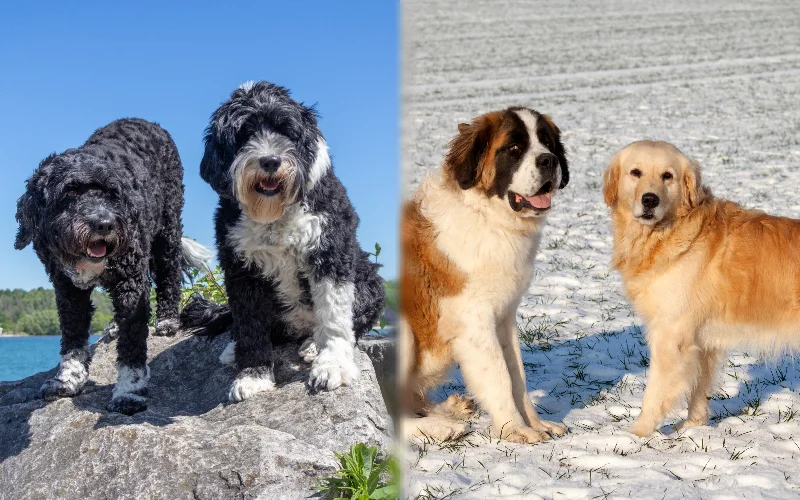

Things to Know When Owning a Golden Retriever Portuguese Water Dog Mix
Food & Diet Requirements
Choosing a suitable food formula and feeding in proper portion sizes is key to keeping your dog at a healthy weight, maintaining good skin and coat condition, and supporting overall health. Dogs are omnivores, and their diet should be complete and balanced and contain the right amounts of protein, carbohydrates, fats, vitamins, and minerals. Clean water should be kept out at all times.
Some people make their own dog food, but it can be tricky to get this right, so should only be done with guidance from a vet or professional nutritionist. The most convenient way to make sure your Golden Retriever Portuguese Water Dog mix gets all the nutrients they need is to buy a commercial formula that is suitable for your dog’s age and produced by a trusted brand.
Exercise
Exercising your dog enough is essential to keeping them stimulated and generally out of trouble. Dogs that are bored due to a lack of exercise are much more likely to behave destructively (chewing inappropriate objects, scratching things, being hyperactive, etc.).
Golden Retrievers and Portuguese Water Dogs are both active and energetic breeds, so your mix will need around an hour to 90 minutes of exercise per day as an estimate, though every dog has different needs in the exercise department.
In addition to daily walks, your Golden Retriever Portuguese Water Dog mix may enjoy activities like agility training, going for a jog, games, playing with toys, and swimming.
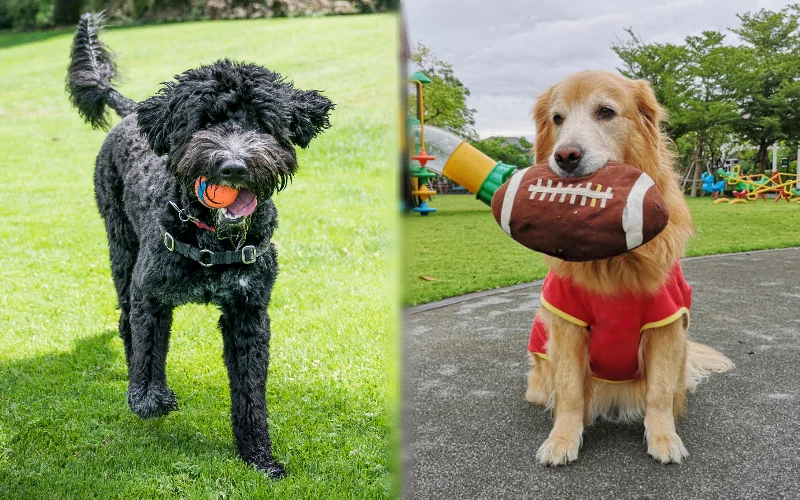
Training
Golden Retriever Portuguese Water Dog mixes are likely to be quite trainable due to the intelligence and strong work ethic of the parent breeds. It’s best to start training as soon as your puppy or adult dog comes home, beginning with core commands like “sit,” “come,” “stay,” and “down.” These will set the foundation for training and help ensure your dog stays safe in a variety of situations.
The key to training is finding out what motivates your dog. Do they have a favorite treat that they light up at when they see you fishing one out of the bag? Or perhaps they can’t get enough of being praised by you? Some dogs respond best to certain toys rather than treats or praise. Whatever it is, you can use it to mark good behavior and keep your dog engaged during sessions.
Grooming ✂️
The parent breeds have very different coat types. While the Portuguese Water Dog’s coat is considered to be hypoallergenic (though this doesn’t mean they won’t shed at all; all dogs shed, even if it’s only a tiny bit), the Golden Retriever has a double coat that sheds moderately throughout the year and much more heavily when shedding season arrives.
If your Golden Retriever Portuguese Water Dog mix inherits a coat that’s more like the Golden Retriever’s, they may need to be brushed once or twice a week as a rule and daily during shedding periods.
If the coat is more like the Portuguese Water Dog’s, it won’t shed anywhere near as much but will still need to be groomed regularly—at least every other day—to prevent it from getting matted. You might also consider getting the coat clipped by a professional groomer. Don’t forget to check the nails regularly, too, to see if they’re due a trim.
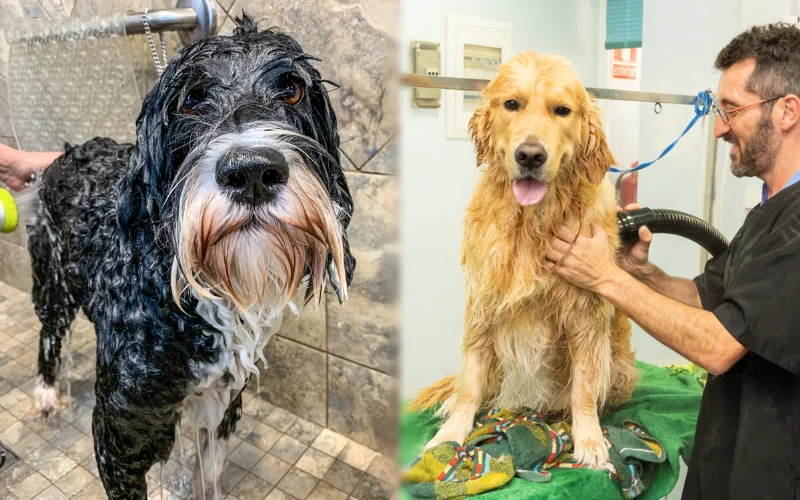
Health and Conditions
Although it’s often said that mixed-breed dogs are healthier than purebred dogs, some studies have shown that mixed-breed dogs are often just as vulnerable to certain genetic health conditions, so it’s important to be aware of conditions that sometimes affect the parent breeds, just in case.
Golden Retrievers and Portuguese Water Dogs have both been linked to hip dysplasia, eye conditions like progressive retinal atrophy, and heart problems. Try not to worry too much, though. Your dog may never suffer from any of these conditions; it’s just best that you know about them so you can be more vigilant for signs that something is amiss.
- Minor allergies that go away with treatment
- Mild cold signs (check with a vet what’s causing these, though, as cold-like signs in dogs can sometimes indicate other conditions, like bacterial infections and kennel cough)
- Heart diseases
- Progressive retinal atrophy
- Hip and elbow dysplasia
- Neuronal ceroid lipofuscinosis (nervous system conditions)
Male vs. Female
Whether your mix is male or female, they’re sure to make a wonderful companion. Individual dogs have different personality traits, and these can’t be determined by sex.
In terms of biological differences, male dogs are often a little bit bigger and heavier than females, and each sex goes through different processes when in heat or seeking a mate. Female dogs that have not been spayed typically go into heat twice yearly, though this can vary by size and breed.
When in heat, female dogs may display a variety of behavioral changes, including more frequent urination, becoming more clingy, becoming more anxious and irritable than usual, lethargy, restlessness, and appetite changes. They also experience some bleeding from the vulva.
Unneutered males seeking out a mate can become harder to manage, more territorial than usual, and more prone to roaming. They also mark objects (and sometimes even people if they’re very unlucky) with their urine.
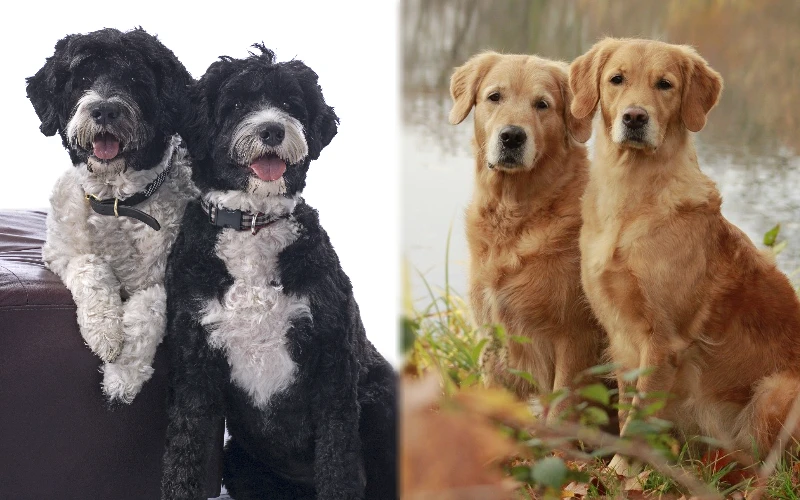
3 Little-Known Facts About the Golden Retriever Portuguese Water Dog Mix
1. The Parent Breeds Come From Working Backgrounds
Golden Retrievers were developed in Scotland in the 19th century as game-retrieving dogs and water retrievers, while the Portuguese Water Retriever, which originated in Portugal, was bred to be a fisherman’s canine assistant. They were also used to retrieve items from the water in addition to herding fish and acting as messengers.
2. Golden Retriever Portuguese Water Dog Mixes Often Have Webbed Paws
Since the parent breeds were both used as water retrievers, this mix will also likely have webbed paws. These helped the parent breeds navigate through the water smoothly.
3. Portuguese Water Dogs Are Sometimes Used in Rescue Missions
Thanks to their aptitude for swimming, Portuguese Water Dogs sometimes participate in water rescue missions. The Golden Retriever is also a popular choice for water rescue organizations. Water rescue dogs are also known as “lifeguard dogs.”

Final Thoughts
The Golden Retriever Portuguese Water Dog mix is a truly lovely combination of two fantastic dog breeds, but they can be hard to come by. If a specific type of dog isn’t the be-all and end-all for you, why not expand your horizons and see what shelters and rescue organizations have to offer?
In shelters or foster care, you can find a wide variety of adorable and loving mixed breeds in need of a second chance, even some that you perhaps wouldn’t expect. It’s always worth keeping your options open!
Related Read:
Featured Image Credit: Left – Jennay Hitesman, Shutterstock | Right – Shayna Douglas, Unsplash

